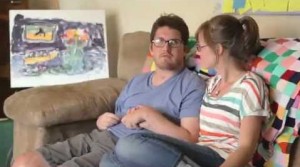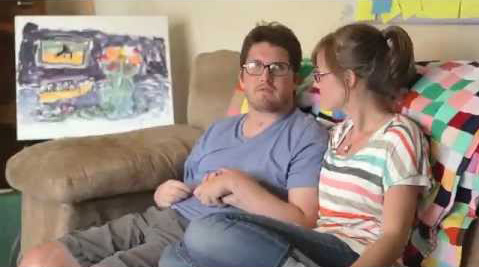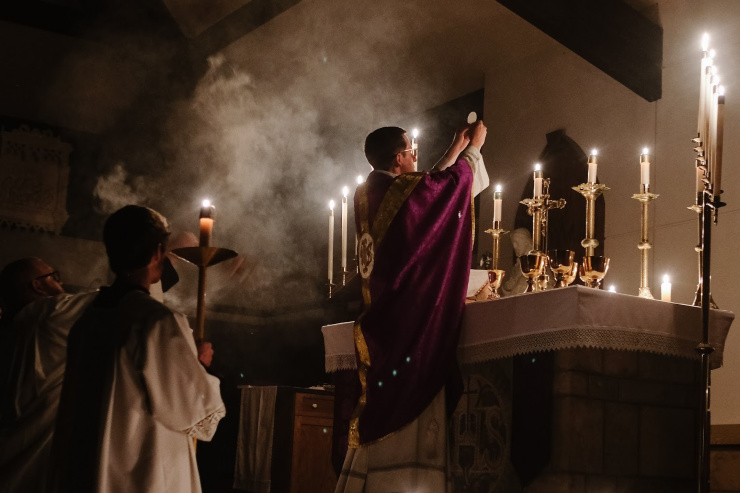
Ian & Larissa
A video has gone viral on the Internet in the last couple days – the true life, short film love story of twenty-something Larissa and Ian. The two met in college and dated almost a year, heading seriously toward marriage, when Ian was involved in a near fatal car accident which disabled him. Not only did Ian suffer physical impairment but also traumatic brain injury. The family did not expect him to make it through the night. Brain activity had ceased. But the next morning, brain activity began coming back. This gave everyone hope that Ian might make it.
Ian did make it, but his progress was slow. When Ian came out of a coma he couldn’t speak. Doctors did not know the extent of his injury or what it would mean long term, if he made it long term. No one would have blamed his girl friend Larissa for wanting to move on, to pray for him, kindly visit occasionally and close that chapter of her life. Instead, she moved in with his family and began taking shifts in caring for him.
Over time, Ian made improvement. He was able to sit up with help. Larissa was able to take him out on some ‘dates.’ “We must have looked like weirdos,” she said about them sitting in a restaurant together enjoying one another’s company but before he could eat or speak.
Slowly, Ian regained some speech. Although he was still disabled he made amazing progress, with the love and support of his family, physical therapists and, most of all, Larissa. After several years of therapy and progress bit by bit, Ian was able to marry the love of his life. The video of Ian and Larissa’s wedding and the story of their unusual marriage is what is making rounds… and spiking sales of Kleenex tissue around the country.
Larissa demonstrated and still demonstrates radical love.
My cousin Liz and her husband Kevin are the proud parents of a large brood of children. Their oldest son Kevin was diagnosed with Muscular Dystrophy when he was young. Dad Kevin was self-employed in a law firm to provide for the family. Mom Liz worked as a nurse at the hospital on weekends to provide excellent medical insurance. Kevin’s condition declined and he went into a wheelchair, then lost ability for many muscular functions, slowly.
Most families in a similar situation might have had to turn to a nursing facility for care, or might have chosen to do so because of the difficulty in providing care at home. However, Liz, whose profession as a nurse came in quite handy, and Kevin kept young Kevin close to them and provided as much care as they could, as well as provided as normal life as possible for their son and the rest of their children.
Liz spent her daytime performing normal mom duties- cooking, cleaning, driving, helping children with homework- as she simultaneously cared for Kevin’s increasing needs. At night, she woke up every couple hours, to suction mucous from Kevin’s airways or help him shift his weight to remain comfortable. Kevin was a fan of football and loved watching his high school team.
Before his disease progressed to a debilitating point, Kevin’s dad Kevin wheeled him out on the sidelines each Friday night to sit with his school’s team. Every game, home or away, Kevin and Kevin cheered them on. Football players would ‘high five’ Kevin as they came out for the game. He was every bit a part of that team as they were. I can’t remember, but he might have even been their manager.
Despite the difficult daily dedication of caring for Kevin, Liz and Kevin never complained. In fact, Liz was and still is one of the most positive, upbeat people I know, always with a smile on her face, even when her hands were most full.
There is no cure for Muscular Dystrophy and Kevin died a short time ago in spite of the best love and medical care. I am certain that while Liz and Kevin desperately miss their son, they have no regrets for the time they spent with him and for him.
Like Larissa who demonstrated radical love for Ian, Liz and Kevin also demonstrated radical love for their son, Kevin.
Is radical love only for a few? Is radical love something expressed in unusual situations only once in a while by only rare people with some great and scarce gift? I think not.
I think that radical love is something that each of us is called to express, in different times, in different ways, in many, many circumstances of our lives. Radical love embraces a child who is diagnosed in utero as diseased or disabled, and welcomes him into the world despite his infirmity. Radical love is persistence in getting the necessary academic instruction for a child who struggles and learns differently than others when the established way is road-blocked or ineffective. Radical love is expressed in the patience with and caring for an aging parent who suffers from multiple medical problems, increasing dementia and non-compliance in health recommendations. Radical love is welcoming an orphan into the home, or an unwed mother who has no other place to turn.
Radical love can also be foregoing work outside the home with an income to care for one’s children devotedly and lovingly. Or taking on the entire academic instruction of one’s children at home because the local public school teaches immorality and the family cannot afford Catholic education. Radical love can be working a job one dislikes, finds unfulfilling, even despises- without complaint because ones wife and children depend on it and a more fulfilling job is not available or it does not pay the salary that the family needs. I would bet, dear reader, in fact that you are radically loving someone right now, because when you take your faith seriously you just do that. You choose radical love.
We may or may not ever find ourselves in a situation such as Larissa or Kevin and Liz, but surely there are similar opportunities in everyday life to love radically. The truth is, radical love can be expressed by each and every one of us every day that we make a choice to look outside ourselves and engage the circumstances of our lives positively- to seek meaning from those circumstances and to offer our bodies, our selves and our suffering up and for others. Radical love is not without pain. Radical love in fact, generally faces pain, emotional, physical or sometimes both and says I will love anyway. Radical love is facing circumstances with courage and faith, considering quite literally what Jesus would do and then doing just that.
‘For you were called for freedom, brothers. But do not use this freedom as an opportunity for the flesh; rather, serve one another through love.’ (Galatians 5:13)
Questions to consider:
- How can I make my spouse’s life better, happier, more fulfilling and ease the burden of work and the strife of the world?
- How can I let my child know I love him today? How can I demonstrate the virtues I wish him to possess? How can I teach him the lessons of life that do not come from books or instructors?
- How can I demonstrate Christ’s radical love to someone I chance meet today? What reason might God have for putting a particular person in my path just now? How can I respond in encouragement and hope?
httpv://www.youtube.com/watch?v=AEBzPi2GbkI
Theresa Thomas is the co-author Stories for the Homeschool Heart (Bezalel Books, 2010 & winner of About.com Best Catholic Book of 2010), family columnist at Today’s Catholic News and a contributing writer for the Integrated Catholic Life™.
Please help us in our mission to assist readers to integrate their Catholic faith, family and work. Tell your family and friends about this article using both the Share and the Recommend buttons below and via email. We value your comments and encourage you to leave your thoughts below. Thank you! – The Editors















